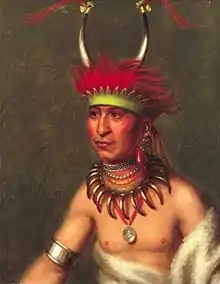Shaumonekusse
Chief Shaumonekusse (c. 1785 – 1837) was a leader of the Otoe Native American tribe in the early 19th century.[2] The Otoe are a Central Plains tribe, closely related to the Ioway, Missouria, Ho-Chunk, and Winnebago.[3]
Shaumonekusse | |
|---|---|
| Sų Manyi Kathi (Prairie Wolf) | |
 Portrait of Shaumonekusse, painted by Charles Bird King circa 1822. On display in the White House Library[1] | |
| Otoe leader | |
| Personal details | |
| Born | c. 1785 |
| Died | 1837 |
| Spouse | Eagle of Delight |
| Nickname(s) | Letan, L'Letan |
Name
The subchief was known as Shaumonekusse, Chonmonicase, Ietan, Letan, and L'Letan. Sų Manyi Kathi in the Chiwere language means "Prairie Wolf." His name is also spelled Sų Manyi Kasisooⁿ and Shųmanyikathi.[4]
Personal
Sų Manyi Kathi belonged to the Bear clan.[5] Shaumonekusse was described as a witty and sociable person, and "a daring, active, and successful warrior. We are not aware of his having any hereditary claims to the chieftainship of his tribe, to which he has risen gradually by his own merits. He is a person of deep penetration, and is capable of acting with much duplicity on any occasion when he may consider it politic to conceal his real views."[6]
Career
"He recounted his deeds in 1819 during a dance performed before members of the Stephen Long Expedition to the Rocky Mountains. Later in life he killed his brother after a fight in which the latter bit off the end of his nose."[7]
Shaumonekusse traveled with an American Indian delegation to Washington, DC in 1821 to meet with high-ranking officials, including President James Monroe. Of his five wives, he took the youngest, Eagle of Delight, with him to the American capital.[8] Charles Bird King painted both of their portraits on that trip.[9]
References
- "National Portrait Gallery, Smithsonian Institution". Retrieved 2013-01-31.
- McKenney, Thomas L (1872). History of the Indian tribes of North America with biographical sketches and anecdotes of the principal chiefs. Embellished with one hundred portraits from the Indian Gallery in the War Department at Washington. Philadelphia: D. Rice & Co. Retrieved 2013-01-31.
- "Otoe & Missouria: Five Hundred Years of History". The Otoe-Missouria Tribe.
- "Sų Manyi Kathisooⁿ MAH-nyee KAH-thee". Otoe-Missouria Dictionary. Retrieved 15 January 2021.
- Pipestem, Veronia, Rock, and Wolf. "Native Perspectives". The Metropolitan Museum of Art. Retrieved 15 January 2021.
{{cite web}}: CS1 maint: multiple names: authors list (link) - "Chonmonicase or Shaumonekusse, Otto Half Chief". Access Genealogy. Archived from the original on 2013-02-19. Retrieved 2013-01-31.
- "Chonmonicase, an Otto Half Chief". A Gathering of Nations: Images from McKenney & Hall's History of the Indian Tribes of North America. Retrieved 2013-01-31.
- McKenney, Thomas L (1872). History of the Indian tribes of North America with biographical sketches and anecdotes of the principal chiefs. Embellished with one hundred portraits from the Indian Gallery in the War Department at Washington. Philadelphia: D. Rice & Co. Retrieved 2013-01-31.
- "Old map by McKenney - Hayne-Hudjihini the Eagle of Delight". Antique Map Price and high resolution image source. Retrieved 2013-01-31.
External links
- "Shaumonekusse", Indian Tribes of North America, Washington, DC: Smithsonian Institution, 1910